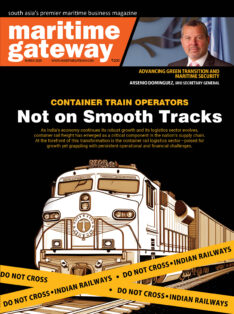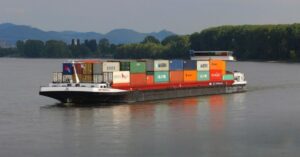You have been in the thick of Customs industry as a Customs Broker and an educator and closely observing the regulatory framework for more than four decades now. So, in the past decade, how the Custom Broker role has changed or rather evolved and what are the challenges that you see today, Custom Broker community faces?
We are working on processing of Cargos across an international border and our basic function would be to ensure proper compliance. When one looks at the obligations in our regulations, they are very heavily based on safety, security and compliance. So, in one manner, I am a compliance officer and I have remained that right from 1962 that I have been responsible for compliance on account of the importers and the exporters who I represent. It is my responsibility to not only advise them, but to also ensure that they follow the advice, which has to be based on legal compliance issues. So, that has not changed at all.
But what has changed is the way the Custom Broker is being forced to look at things which are outside his purview. The definition of a Custom Broker under the Customs Act or under the various
regulations under which we are licensed has not really undergone a major change at all. But we are expected now to be real multi-taskers. I have seen this whole industry undergo multiple changes. Earlier my job was to file a document, process it through Customs and give the delivery. I was not really expected to deal with anybody other than the custodian. Today, I am expected to deal with every other possible stakeholder other than myself. I am expected to finance every of those activities. I am expected to take ownership of every activity that the stakeholder has to do with respect to an individual Customs clearance. So now suddenly I am responsible for transportation, packaging, certification, maybe even fumigation, palletisation, carrier issues, legal issues with the participating government agencies, and the standard answer one gets from the exporters and the importers is you have to do it.
You mentioned there is a lot of multitasking and challenges. So, how do you see the Indian Customs community gearing up to meet this kind of multi-tasking today?
I see the computer has made it easy for all of us. There is a lot of information that the government has put out in the public domain which is available. So it is a bit easy for somebody who has been able to adapt to understanding the macro issues in the movement across borders, the macro issues in the trade agreements, the macro issues as viewed by the foreign trade office. Once I have understood the macro issues for me to implement the micro, I only need to be good at English. At whatever stage we may be in our careers, we are all learning how to use the computer systems very effectively.
Most of the Custom Brokers can answer any questions just by referring to their smartphones.
So that sort of a change has come in. In addition to this, FFFAI and the Logistics Sector Council and a large number of smaller institutions also, each of them is working to impart skills to the existing Custom Brokers and in the last 2 to 3 years a very welcome change has come and that is the Custom brokers are now realizing that their offices are not as efficient as the leader of the organization but as the entry level person. And now we are seeing a lot of investment happening in training and up-skilling the entry level people.
Earlier we have seen there were a lot of trust issues with the Customs Broker either from the regulatory side or even from the shipper side. So what has been done to actually change the image of the Custom Broker? You mentioned about exim community not extending the kind of a respect, So what do you think are the reasons and what do you expect them to do, to understand the Custom Broker in the real sense?
First of all it is important for us as a community to be able to go across and tell people that look I am important, I am relevant and without me you can’t work. This is happening across the country. You go to any state, you go to the Chambers of Commerce, the CIIs, ASSOCHAMS, the PhD chambers, everywhere you are now seeing active participation from the Custom brokers. It’s happening across the country. There’s hardly a state where a Custom Broker is not sitting actively at a Chamber of Commerce.
The sad thing is that with so much thrust on contactless activities with the department our earlier interactions with the Customs Officers, where we met regularly and talked across over a cup of tea. We could go across and tell them that this is not happening correct. That has unfortunately only gone up to the Commissioner level and higher.
Access to an Additional Commissioner or a Commissioner level has become very easy, to walk across to him and talk about the issues, but the micro issues which we face on daily basis have to be handled by the lower officers. And that interaction has unfortunately undergone a lot of change which will have to be addressed just in a similar manner that the DGFT has addressed it by making everybody available through a virtual conference. Still, Customs has not reached that stage. Customs will have to reach that stage.
Then comes the Customs department itself. I like to talk about something very different. If suppose an adjudicating authority, a Commissioner takes a decision on a file where the value of the file is more than 50 lakhs Rupees, the whole structure is that a copy of the decision goes to vigilance. Now, this tells the Customs adjudicating authority at stage one that the government is not trusting your decision. Why should a decision directly go to vigilance? It should go to vigilance if there is a complaint, if there is a reason to doubt the integrity or the judgement. But with this mandatory sending of judgments to vigilance, you notice that Custom Officers, Adjudicating Officers don’t want to take chances.
And that is why we suddenly see a large number of Custom Brokers being show cause, penalized, suspended or revoked. And one really studies it at the C-stat level. Nearly 90 plus percentage of the decisions are reversed. So, somewhere the administrative structure of the government needs to be looked at to stop the poor average Custom Broker from being victimized for no fault on his part.
On one side, we understand that Customs Department has become very proactive in adopting digitalization, bringing a lot of reforms, I see many regulatory documents are coming in a quick succession, which says that they have been moving very fast. On the other side, I hear you mention, it has become rather over regulatory and too much of authoritarianism has come in. So, how do you see on both the sides of this Customs department?
Let me answer your questions slightly differently. Do we need so much of digitization?
Do we need so much of system driven processing? The answer is a very big yes. We must recognize that India does today around 53,000 – 54,000 transactions every day on movement across borders.
And if India really wants to increase its export, I mean its share of the international trade to maybe a 7 or an 8% by rough estimates this 53,000 should go up to at least 160,000 every day. Now 160,000 transactions spread across 30 to 35 cities in India, being handled by more than 200 Custom stations cannot happen unless we digitize the whole thing.
The question is, are we actually prepared for it? The Custom Brokers took a while, they took 2 or 3 years to accept that yes digitization is the way forward. And now if you will look at the Custom Brokers in India, we are supporting every digitization move that the government is bringing,
but on the departmental side, it has been a top down approach, it has been fore sit down. So the average officer, the Appraiser, the Superintendent, the Assistant Commissioner, are they actually ready for all of this? They are not ready for this. And I wouldn’t shy away from saying this at any forum, that they are not ready for so much amount of digitization, so much amount of facilitation and movement to post clearance audit.
Yes, slowly their acceptance level is increasing, the systems are getting more and more robust.
One can administer something very smoothly by taking every stakeholder into confidence. This is where the government is lacking. They would do a discussion today and say it’s being implemented from tomorrow. At least give the stakeholder 7-8 days to understand the processes, do test runs at different places and then implement all of them.
Even the officers need to be trained correctly into doing it. They need to understand that digitization is not taking away their authority, it is not taking away their policing requirement. It’s only making it more simple, more systemized and they’re trying to do it so that when we move from this 53,000 above, it doesn’t become a big mess. Like if you look at it in the good old days like in the 80s or when in the early 90s, they were very clear systems that the Assistant Commissioners reviewed every query in the evenings. The queries were made, then queries went out to the importers and the exporters, but they reviewed it. But with faceless and other type of formats, there is no review on the type of queries that are being raised. It’s only if you raise it as a specific case, then only it is reviewed otherwise it is not reviewed.
There is too much hurry everywhere. And if you notice implementation of GST, the Customs wallet, everything took 8 to 12 weeks to settle down. So that’s too long a period. Instead of that, if they just do a test run on a few things for maybe fifteen days things can happen much more smoothly.
We have seen a glut of containers and people are talking about a slowdown in Europe and even the holiday season also seems to be not very encouraging. So what is your take on the business prospects for the maybe next couple of quarters?
See, first of all, we must remember and understand that the cake size of export/import has got smaller. This unfortunately has led to a lot of unhealthy competition amongst the freight forwarding community where everyone now wants to do everything without having understood what is actually happening. Today when you talk to the Freight Forwarders, the Custom Brokers, the shipping lines, the airlines, even the custodians, nobody is talking about groups. Everyone is talking about maintaining their volumes, protecting whatever was their constituency, if I may say, or whatever was their shipment count/ volume count.
You mentioned about nobody’s talking about growth and there is lot of competition, the pie size has become smaller, but on the other side, the government is talking about getting into a five trillion economy and then the ministry is bullish about making let’s say 10 billion MT port capacities in the next two decades. So do you think all this is too ambitious when you compare with the ground reality?
Shipping is a cyclical industry. So with the creation of more infrastructure, the vision to have more probabilities on export is the correct thing. It’s only a question of when will the government and the exporting, importing industry actually sit down and be able to find out how they can help each other.
Like the government has come out with something called the manufacturing and other operations
in warehouse regulations. One of the best regulations that could ever have come out in India, but there is so much mistrust in the importing community that they have not picked it up with two hands.
The Authorized Economic Operator, wonderful program, but the central government, I mean the board and the international customs division is so confused on that, the AEO program doesn’t give anybody a certification in less than maybe 5 to 6 months, sometimes even one year. They don’t have a robust renewal system.
You have the AEO scheme where exporters, importers, logistic operators are interested, but the government is delaying giving the certification. If you look at the way the Custom Act and the other enactments have been amended over the last eight years, they are talking about facilitation, sharing of information, bringing everybody onto a common portal. But you look at GST refunds, Customs issue, Custom refunds, it’s another big issue which is pending.
So when you talk to an average exporter/importer, for him to say that my 50 lakhs, two crores, three crores is blocked in the government machinery is a very normal thing. The regulators needs to sit up and look at this. Implementation of the trust is still taking a backseat.
For the Customs broker, which are the skill sets that will be in demand? What is your advice to the Custom broker companies and to the youngsters who want to join this community?
Earlier my generation was expected to know everything at the same time. Today’s generation is much better off. The skill sets that they require according to me would be a small capsule of domain introduction that these are the terminologies, these are the macro level issues. This is what the law says. They only need that much.
Along with that, they need a good working knowledge of the English language. They need to be very good at assessing that information either through their smartphone or through the computer because now everything is available to them at the press of a button. So their ability to be able to use the digital media to get their information is another skill that they will require.
We use the word compliance very often. So compliance is basically following the law. But compliance for today’s worker is his ability to ensure that the correct alphabets, numbers, descriptions are fed in because if he feeds that incorrectly, the computer is not going to stop it at any point in time.
The second part of your question as to what is actually happening. The federation is in dialogue with the board to re-look at the way the customs examinations are conducted because somewhere we are still stuck in the old formats of examinations, but we want to do everything on the computer. We have undertaken a program to go to 100 colleges or schools at the 12th level or at the second year, third year level of graduation to make them understand what is logistics? What are entrepreneurship options open for them? When we go there, we notice that most people have no idea about logistics. Parents have no idea about logistics. Somewhere you need to be able to spread awareness so that the acceptance in society, at a common man’s level increases that yes, logistics is a good industry.











